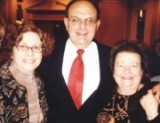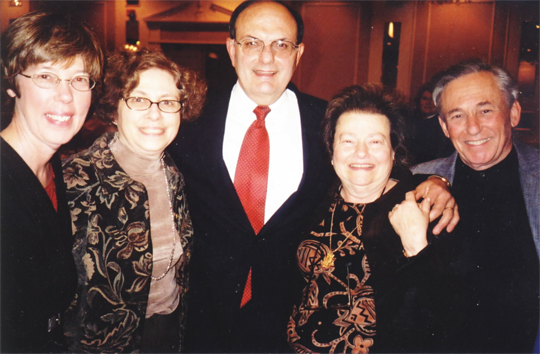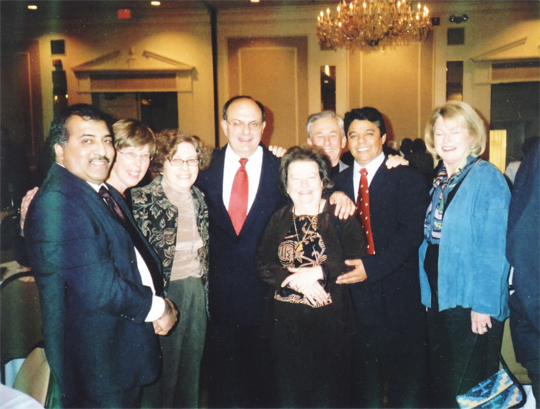Boston Globe October 17, 2004
In 1969, the House of Representatives passed an amendment to abolish the Electoral College by a huge bipartisan vote of 338 to 70. President Nixon endorsed it, and prospects for passage in the Senate seemed reasonably good.
However, Senators Strom Thurmond (R-SC) and James Eastland (D-MS), die-hard segregationists who had voted against every civil-rights and voting-rights measure that had come before them, fiercely opposed having presidents elected by a national, popular vote. They stalled the measure for nearly a year, and in late 1970 it was finally shelved.
Peculiar Institution
Alexander Keyssar
Critics Say the Electoral College is Antiquated, Undemocratic — and, many fear, impossible to get rid of. But in 1969, it almost met its end
One of the more surprising features of the controversy surrounding the 2000 election was its failure to spark any sustained effort to abolish or reform the Electoral College.
When it first became apparent that Al Gore had won the popular vote but lost the election, some politicians and pundits predicted that the end had finally come for America’s most peculiar political institution: Americans, after all, believed that democracy meant majority rule.
But months later, when a variety of committees began to consider reforms that could spare the country a repeat of Election 2000, the spotlight focused on voting technology and provisional ballots rather than the Electoral College.
The National Commission on Federal Election Reform, headed by former presidents Carter and Ford, decided early on not to even discuss the issue. “I think it is a waste of time to talk about changing the Electoral College,” Carter observed. “I would predict that 200 years from now, we will still have the Electoral College.”
Carter’s prediction stemmed not from enthusiasm for the Electoral College (he had strenuously urged its abolition when he was president) but from a widely shared pessimism about the possibility of getting rid of it. The key to that pessimism was the conviction that the “small states” would never relinquish the advantage that the Electoral College gives them.
According to the Constitution, each state casts a number of electoral votes equivalent to the size of its delegation in the House of Representatives (which is proportional to the state’s population) plus two (for its two Senators). This system gives disproportionate weight to voters in small states: In 2000, for example, South Dakota had one electoral vote for every 230,000 people, while each of New York’s electoral votes represented more than 500,000. Whatever the merits of the arguments for and against the Electoral College, it was assumed that the small states would defend this numerical advantage and block any constitutional amendment instituting a national popular election. Only fuzzy-minded idealists would want to tilt against that windmill.
What was not discussed in the aftermath of the 2000 election was the little-known fact that the United States came very close to abolishing the Electoral College in the late 1960s. A constitutional amendment calling for direct popular election of the president was backed by the American Bar Association, the Chamber of Commerce, the AFL-CIO, the League of Women Voters, and a host of other un-fuzzy-minded pillars of civil society. On Sept. 18, 1969, the House of Representatives passed the amendment by a huge bipartisan vote of 338 to 70. President Nixon endorsed it, and prospects for passage in the Senate seemed reasonably good. A poll of state legislatures indicated that the amendment would likely be approved by the requisite three-quarters of the states.
The effort ultimately failed — but not because of concerted opposition from the small states. In fact, many political leaders from small states supported the amendment. What blocked the reform movement was a more troublesome cleavage — one involving race and the political power of the South.
. . . . .
The way America elects its presidents has been controversial since the early years of the Republic. Between 1790 and 1890, more than 200 amendments were introduced into Congress to alter the electoral system, and a similar number appeared in the 20th century.
Between 1948 and 1956, Congress seriously considered several amendments designed to eliminate the “winner take all” allocation of electoral votes — ironically, in order to reduce the power of the large states, such as New York, which were viewed as the keys to presidential elections. One amendment called for the electoral votes of each state to be divided among candidates, in proportion to the popular vote that they received (similar to the proposal now on the ballot in Colorado). Another would have distributed a state’s electoral votes among its congressional districts (much as Maine and Nebraska do now).
Amendments calling for a direct popular vote had also been introduced as early as 1816, but for most of our history such proposals were doomed by a stark political reality: The South would never accept them. The issue was not small states versus big states but slavery and racial discrimination.
Before the Civil War, the “three-fifths compromise” in the Constitution meant that slaves counted (as three-fifths of a person) towards a state’s representation in Congress and thus in the Electoral College. Had the president been elected by a popular vote, Southern influence would have shrunk sharply, limited to the number of votes actually cast.
This system operated even more perniciously during the Jim Crow era (extending into the 1960s), when the white South benefited from what could be called the “five fifths” clause: African Americans counted fully towards representation in Congress and the Electoral College, but they still could not vote. The number of votes actually cast in the South between 1900 and 1960 was tiny in comparison to the size of its electoral vote. A popular election for president, thus, would have dramatically reduced the political power of the South while creating pressure for Southern states to expand the franchise.
Yet the landscape of racial exclusion was shifting in the 1960s, in ways that opened the door to electoral reform. The 24th Amendment banning poll taxes (1964), the Voting Rights Act of 1965, and a series of Supreme Court decisions led to the enfranchisement of African Americans in the South and to more uniform suffrage requirements throughout the nation. In addition, the Supreme Court embraced the principle of “one person, one vote,” insisting that legislative districts be roughly equal in size. Having a vote be “worth more in one district than in another,” the court declared in 1964, violated “our fundamental ideas of democratic government.”
These momentous changes meant that the South had less to lose from direct presidential elections. They also reflected a broad-gauged impulse to fully democratize American politics — an impulse that fed the drive to abolish the Electoral College. Senator Howard Baker of Tennessee, a Republican from a small state and an ardent advocate of direct elections, insisted that eliminating the Electoral College was “a fundamental question of national fairness.”
“Any system which favors one citizen over another or one state over another,” Baker declared on the Senate floor, “is . . . inconsistent with the most fundamental concept of a democratic society.”
Reform efforts were also spurred by some unusual twists in presidential elections. In the four-person race of 1948, Dixiecrat Strom Thurmond attempted to force the election into the House of Representatives by preventing any candidate from gaining an Electoral College majority. In 1960, John Kennedy’s razor-thin victory over Richard Nixon raised the specter of a president being elected without winning the popular vote.
A final jolt came in the run-up to the 1968 election, when some analysts feared that segregationist candidate George Wallace would win enough electoral votes to deny a majority to either Nixon or Hubert Humphrey and would then act as a king maker, offering his electoral votes to the candidate most willing to cut a deal. As it turned out, Nixon did not need any of Wallace’s 46 electoral votes, but the risks had been made apparent — and they were underscored when a “faithless” Nixon elector from North Carolina decided to cast his vote for Wallace instead. Within months, Congress went into action.
. . . . .
In February 1969, the House Judiciary committee, chaired by 81-year-old Emanuel Celler of New York, began hearings on electoral reform. Uncommitted to any particular plan, the committee entertained proposals for direct elections, proportional systems, district systems, and minor tinkering that would simply cure the problem of the “faithless” elector.
The committee listened to the testimony of more than 100 witnesses, including business and labor leaders. Among the witnesses was law professor John Banzhaf, the author of an influential “mathematical analysis” showing that, contrary to popular opinion, the Electoral College gave more “voting power” to citizens of large states — an inequality that could be remedied only by popular elections. The committee endorsed that view in April, approving a direct-election bill by a vote of 29 to 6.
On Sept. 10, the committee’s proposal reached the floor of the House, and eight days later it passed by far more than the required two-thirds vote. Nixon went on to endorse the bill, and several national polls indicated widespread public support for the abolition of the Electoral College.
But the momentum for reform was about to slow. The Senate Judiciary Committee was chaired by James Eastland of Mississippi and counted Strom Thurmond among its members. Both men were die-hard segregationists who had voted against every civil-rights and voting-rights measure that had come before them. Neither wanted to have presidents elected by a national, popular vote.
Eastland used his prerogatives as chair (and Thurmond’s threat to filibuster the committee) to keep electoral reform on the back burner. Early in 1970, however, Birch Bayh — an able young senator from Indiana who chaired the subcommittee on constitutional amendments and favored direct elections — engaged in an adroit procedural maneuver to force the Judiciary committee to address the issue. When President Nixon nominated conservative Southerner G. Harrold Carswell to the Supreme Court (after the Senate had rejected the equally conservative but ethically challenged Clement Haynsworth of South Carolina), Bayh threatened to hold up the Judiciary committee’s consideration until Eastland set a date for hearings on the Electoral College.
Eastland and Thurmond relented, and the bill, after passing the committee by a vote of 11 to 6, reached the Senate floor in early September 1970 — nearly a year after the momentum for reform had crested. Senators Bayh, Baker, and others spoke eloquently about the shortcomings of the Electoral College and the virtues of popular election. But they were greeted by a prolonged filibuster led by Sam Ervin of North Carolina, another opponent of civil rights and the Voting Rights Act. For several weeks, Ervin, Thurmond, and their allies took the floor to criticize the measure, arguing that it would undercut states’ rights, harm the small states, destroy the two-party system, and encourage splinter parties, fraud, and intrusive national voting requirements. They also stalled relentlessly, even reading into the record the name of every prime minister of France since 1800, as evidence that direct elections produced instability.
The critical votes came on Sept. 17 and 29, on proposals to invoke cloture (end debate) and bring the direct-election amendment to a vote. The first cloture vote failed by six votes and the second by five. On Oct. 5, the issue was shelved indefinitely.
. . . . .
So what was it that tripped up a reform whose time seemed to have come? The votes on the cloture motions tell a key part of the tale. More than two-thirds of all Democrats supported cloture, presumably favoring the direct-election amendment. The Republicans were evenly divided, as were Senators from the 26 smallest states.
The critical cleavage was regional: Only six southern senators voted to end debate, while 20 did not. Sixty percent of all of the “no” votes came from the South. What defeated the drive for direct elections was not the opposition of the small states — although that did play a minor role in the debates and the Senate vote. The key instead was the resistance to change from a region whose politics had long been shaped by racial exclusion.
The political landscape was indeed shifting, and after the Voting Rights Act of 1965 the Electoral College could never serve the white South as it had in the past. But in 1969 no one knew how it would all turn out, or how George Wallace might fare in 1972. Savvy old-timers like Ervin and Thurmond were preserving the familiar, protecting states’ rights wherever they could, resisting further intrusions by the federal government. Direct elections were one more threat to the old order, and this was a battle that the South could — and did — win.
The outcome of that battle ultimately led to George Bush winning the White House in 2000. It could also determine the victor in this year’s tight race. If a candidate once again wins the Electoral College but loses the popular vote, pressure for change will certainly mount, and there is no telling how different political interests might line up.
Alexander Keyssar is professor of history and social policy at Harvard’s Kennedy School of Government. He is currently writing a history of American political rules and institutions.



